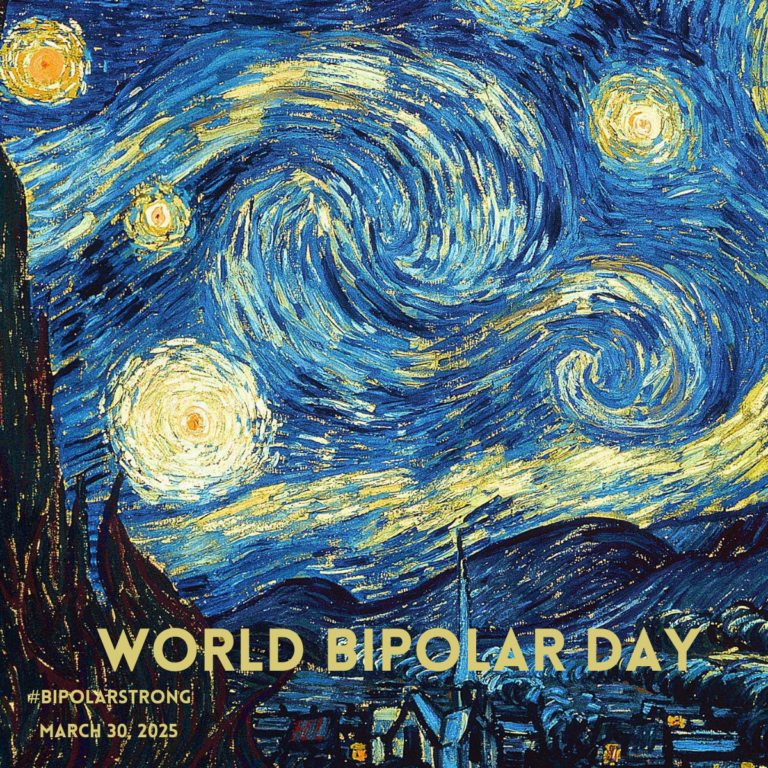Director, Sid’s House Mental Health Association in Stokes County, NC
(sidleemha.org and on Facebook)
Honoring Vincent van Gogh and Raising Awareness
March 30—Happy 172nd birthday, Vincent van Gogh! In your honor,
three international mental health organizations established World
Bipolar Day, recognizing the posthumous diagnosis of bipolar disorder
that shaped your turbulent yet brilliant life.
Your art, your misunderstood illness, and your extraordinary spirit live
on. We want the same for our loved ones with bipolar disorder—for
them to live on, here and now.
Van Gogh’s Legacy and the Stigma That Remains
During your lifetime, Vincent, your art went unsold (well, except for one
piece your brother managed to sell). Worse, you were trapped in a
society that feared mental illness and unconventionality. Institutionalized
before your death, your suffering was dismissed, though today your
work is priceless. Ironically, the world has diagnosed you—too late to
help.
Being “ahead of your time” didn’t lessen your pain, and though we live
in a more informed era, stigma and misunderstanding persist. The
“Bipolar Express,” as my family calls it, still hurtles through a “Starry
Nightmare,” its passengers struggling for stability. We’re still not where
we need to be—within a state of knowledge, empathy, and respect for
mental illness
One life-changing difference? Medication. Advances in neuroscience
have given us treatments that can return the brain to near-normal
function. But, there are usually side effects. Researchers continue their
work, searching for more answers.
Why World Bipolar Day Matters
You know someone with bipolar disorder—even if you don’t realize it.
They may keep it secret, even from themselves. On March 30, let’s
commit to learning one new fact about bipolar disorder. And let’s use
that knowledge to dignify those who live with it, protecting them from:
•Insults (“crazy,” “nutcase,” “hopeless”)
•Neglect (“tough love,” embarrassment, ignorance about medical
symptoms)
•Hostility (“just be stronger,” “pull yourself up by your bootstraps”)
A Personal Connection: My Son, Sid Vincent
When my husband, Jeff, and I were expecting our son, we debated
names. We had named our daughter Georgia, after Georgia O’Keeffe.
Jeff, an artist, was set on Vincent—for van Gogh, of course.
I admired van Gogh’s work, but I hesitated. His death by suicide
unsettled me. If our son had bipolar disorder in the future, he’d still be
perfect. And illnesses are treatable. And anyway—what’s in a name?
I later learned that bipolar disorder runs in families—in both mine and
Jeff’s. But at the time, we didn’t know bipolar carried a heavy genetic
component. We didn’t know that 15-20% of those with bipolar disorder
die by suicide. We didn’t yet understand how deeply this disease affects
families.
In the end, we compromised. His middle name would be Vincent. Just a
feeling. Just in case.
Understanding Bipolar Disorder: A Brain Disease, Not a Choice
Bipolar disorder is a medical illness, not a character flaw. The brain—a
complex organ with 100 billion neurons—misfires, sending emotions
and thoughts off track. Like a train derailment, this isn’t something you
can simply will back onto the rails.
Yet, people still say: Just try harder.
Imagine telling someone with heart disease to fix their own heart, or a
cancer patient to stop their cells from multiplying. That’s how absurd it is
to suggest that people with bipolar disorder “think” their way out of their
suffering.
Still, even in 2024, people with bipolar disorder face judgment, not just
symptoms. Society blames them. They blame themselves. Many avoid
diagnosis, fearing stigma. Some self-medicate with drugs or alcohol,
desperate for relief.
Van Gogh, if you were here, I swear you’d still hear it: It’s all in your
head. You just need more willpower.
The High Cost of Misunderstanding
Most people with bipolar disorder do not choose to be rebellious,
suicidal, or difficult. But because of stigma, many suffer in silence. Like
you, Vincent, some ultimately see death as the only escape—from pain,
humiliation, and loneliness.
My son Sid understood this. A brilliant artist with words, paint, and
music, he articulated the agony of bipolar disorder much like you did—
with color, shape, and form. He tried every treatment. Every option.
Every kind of hope we could offer.
One day, he described it to me:
“Mom, bipolar depression is physical pain. I’d rather have every bone in
my body broken—it wouldn’t hurt as much. At least then, people could
see the injury. This is invisible. It’s so lonely.”
We wanted to believe our love, our support, and his intellect could save
him. We fought for him, searched for new treatments, stayed by his
side. But his illness was resistant to medication.
On December 27, 2017, at age 27, Sid took his life. Soon after, his
father, Jeff, died of a broken heart.
We Can—and Must—Do Better
Bipolar disorder doesn’t have to be fatal. Most people who receive the
right treatment live full, productive lives—but getting there requires
understanding.
Understanding means:
•Listening—really listening—to those in pain
•Defending people with bipolar disorder from stigma and
mistreatment
•Educating ourselves through organizations like NAMI, Fighting
Goliath, and the American Foundation for Suicide Prevention
•Taking action when someone is struggling—calling 988, driving
them to the hospital, offering real support
All Aboard the Bipolar Express
We wouldn’t leave a heart attack victim alone to “figure it out.” We
wouldn’t tell a cancer patient to “snap out of it.” Yet, too often, we
dismiss those with bipolar disorder to suffer alone.
Fifteen to twenty percent is an unacceptable death rate. Most suicides
are preventable. And reducing the number of deaths starts with
knowledge, compassion, and treatment.
So, Vincent, maybe this year, on World Bipolar Day, we can finally be
ahead of our time.
All aboard.
Resources
If you or someone you love is in crisis, call 988 or seek immediate
medical attention.
Founders of World Bipolar Day:
1.The International Society for Bipolar Disorders
2.The International Bipolar Foundation
3.The Asian Network of Bipolar Disorder
Statistics:
•National Institutes of Health (NIH), 2024
•World Health Organization (WHO), 2023
Written by:
Mary Hughes Lee





